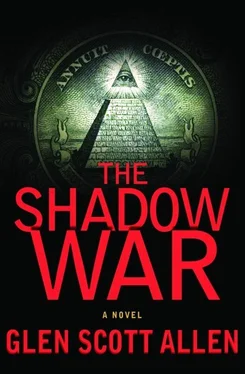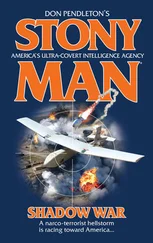Glen Allen - The shadow war
Здесь есть возможность читать онлайн «Glen Allen - The shadow war» весь текст электронной книги совершенно бесплатно (целиком полную версию без сокращений). В некоторых случаях можно слушать аудио, скачать через торрент в формате fb2 и присутствует краткое содержание. Жанр: Триллер, на английском языке. Описание произведения, (предисловие) а так же отзывы посетителей доступны на портале библиотеки ЛибКат.
- Название:The shadow war
- Автор:
- Жанр:
- Год:неизвестен
- ISBN:нет данных
- Рейтинг книги:5 / 5. Голосов: 1
-
Избранное:Добавить в избранное
- Отзывы:
-
Ваша оценка:
- 100
- 1
- 2
- 3
- 4
- 5
The shadow war: краткое содержание, описание и аннотация
Предлагаем к чтению аннотацию, описание, краткое содержание или предисловие (зависит от того, что написал сам автор книги «The shadow war»). Если вы не нашли необходимую информацию о книге — напишите в комментариях, мы постараемся отыскать её.
The shadow war — читать онлайн бесплатно полную книгу (весь текст) целиком
Ниже представлен текст книги, разбитый по страницам. Система сохранения места последней прочитанной страницы, позволяет с удобством читать онлайн бесплатно книгу «The shadow war», без необходимости каждый раз заново искать на чём Вы остановились. Поставьте закладку, и сможете в любой момент перейти на страницу, на которой закончили чтение.
Интервал:
Закладка:
Wolfe tried to make a joke, "I had no idea the Foundation had such a high mortality rate among its fellows," but his face remained grim. "And when did the librarian say Fletcher made this discovery?"
"This past Wednesday."
"The day before he called to request your services?"
Benjamin nodded. "Yes."
"Well then," said Wolfe, rising from his chair and beginning to pace back and forth. "Where does this leave us?"
"Fletcher came here to complete work on a computer program, one he designed to do some sort of analysis of the Cold War. He contacts this Fyodor Myorkin, and something he learns sets him off on a hectic bout of investigation. Something he learns from that piques his interest in these Indian… excuse me, Native American wars. He interviews Dr. Stoltz, and then decides to contact this Orlova at the Russian Cultural Center. And you. And in the middle of all this he decides he simply must talk to Edith Gadenhower about bees."
Wolfe stopped pacing and turned to Benjamin.
"Does that about sum up what we know so far?"
"Well…" Benjamin was thinking of something, a missing link in the series of events as Wolfe had laid it out. "We also know Dr. Stoltz told Jeremy about the diary's discovery, so we have every reason to believe Fletcher knew that the original diary was supposedly at the Morris Estate." Benjamin looked up at Wolfe. "So wouldn't it be logical to assume that he reacted the same way we did? That he asked to visit the estate and see what he thought was the original?"
Wolfe looked quite steadily at Benjamin, smiled appreciatively.
"Perhaps he did just that," he said. "Sometime late last Wednesday, would be my guess."
"The day before his heart attack?" asked Benjamin.
"Precisely," said Wolfe. He took the glass and walked away from the table. He poured a drink, took a sip, then changed his mind and set the glass down.
"Which brings us back to why," Wolfe said. " Why was that diary so important to Dr. Fletcher?"
But Benjamin's mind was wandering, thinking about what he'd seen-or thought he'd seen-in the mural. Perhaps Wolfe could make sense of it. Then he began to wonder just how he would explain his unease: a tiny, indistinct symbol? Possibly familiar faces? A vague feeling about something not quite right in the mural's depiction of American history?
It all started to sound too fantastic, something he might well have imagined. He decided it would be best to wait until he'd had a chance to actually examine the real diary, go over his father's notes again-and have another look at the mural.
Wolfe noticed his concentration, asked impatiently, "What?"
Benjamin shook his head. "Nothing. Look, shouldn't we take all this to Dr. Terrill? Get his permission to travel to D.C. so I can look at the real Bainbridge diary? And then you could consult with this Anton Sikorsky. In fact, we could also find this N. Orlova, at the Russian Cultural Center. We can kill three birds with one stone."
Wolfe frowned at him. "Poor choice of cliches. And that, Benjamin," he said ponderously, "is the one thing in all this confusion that I am absolutely certain we should not do. Not yet, anyway."
Wolfe seemed to come to a decision.
He switched off Fletcher's computer, put it into his briefcase. He surveyed Fletcher's room carefully. Satisfied, he took Benjamin by the shoulder and steered him out of the room, closing and locking the door behind them.
"Let's set this," and he held up the briefcase with Fletcher's laptop inside, "in your room for now. Then let's you and I join the throng in the dining hall. And Benjamin," he grabbed Benjamin's arm, and Benjamin noticed his grip was tense, almost painful, "let's keep it to chitchat at dinner, shall we? Should we run into anyone. Like, for instance, Dr. Soderbergh?"
Benjamin looked at him, nodded.
And then they walked off down the hall, toward Benjamin's room. But Benjamin noticed that Wolfe hadn't bothered to put the strip of tape at the top of Fletcher's door, as though there was no longer any reason to keep it secure.
CHAPTER 23
Wolfe and Benjamin sat on the same bench in the quad, beneath the giant sycamore tree, where'd they been only a day before. Now, however, instead of the bright afternoon sun scattering light across the tops of trees spread out across the low hills beyond the Foundation grounds, it was late evening. The first stars were beginning to appear in the deep purple western sky, and there was a nip in the air that had caused Benjamin to turn up the collar of his jacket.
They'd arrived at the bench after a long walk around the Foundation's grounds; a walk that had seen Wolfe remain almost completely silent and deep in thought; a walk that had followed their very brief appearance in the dining hall.
And Benjamin had felt it was just that: an appearance. As though Wolfe wanted them there for everyone to see, chatty and happy, exchanging hellos with some and a few quiet words of grief over Edith's death with others.
Benjamin had seen Gudrun there, sitting at a table with Stoltz. She'd waved him over, but Wolfe had subtly if forcefully steered him toward another table, with Arthur Terrill and George Montrose. Once seated and with an entree before them, Wolfe had very skillfully kept the conversation to neutral topics: the grandeur of the Morris Estate, the tragedy of Edith's accident. And as soon as the coffee had been served, Wolfe had risen to excuse himself and Benjamin.
"We've still got some tidying up to do," he said, "and we'd best get to it before it gets too late, especially if the police will be here in the morning."
Benjamin said good night to Terrill and Montrose, even as Wolfe was practically dragging him out of the dining hall and into the chill air of the quad outside. But then, instead of explaining his silence during dinner or his haste to leave when it was over, Wolfe had simply led him on their walkabout of the grounds.
Benjamin noticed that they seemed to circumnavigate the area, taking the outmost pathways; in several places Wolfe had left the path to walk toward copses of trees, in some cases only a dozen yards or so from the surrounding fence.
Eventually they found themselves back in the quad, sitting on the bench beneath the sycamore.
And finally Wolfe broke his long silence.
"I'm afraid, Benjamin," he said, sounding quite serious and without any of his usual glib undertones, "perhaps I should have let Arthur give you that severance pay and let you go."
"If you're worried about my talking with Gudrun again…"
Wolfe shook his head. "Look, Benjamin, I said the Foundation had influence. Perhaps I should have used the word 'power'-though in Washington, the first is the most effective expression of the second." Wolfe thought again for a moment, continued, again with a deadly serious tone.
"Most citizens of this country don't realize how our modern government functions, which is only on the advice and counsel of thousands of technical experts, like these." He waved a hand around the Foundation's grounds. "If there's need for a new telecommunications bill, or energy policy, or foreign policy, who do you think plots that all out? All the technical details, the intricacies? Do you think your average senator is up to that task? They're lawyers, for the most part, not technocrats. And half the time they're out raising money to remain senators. So by and large such laws and policies are written by people like these, here at the Foundation. People like your new friend, Gudrun, for instance."
He stood and put his hands in his pockets, apparently against the cold air, then looked down at Benjamin and continued.
"These are ideologues of the first order, Benjamin. People who are absolutely convinced they are right. And they will do any and everything necessary to exercise their… rightness."
Читать дальшеИнтервал:
Закладка:
Похожие книги на «The shadow war»
Представляем Вашему вниманию похожие книги на «The shadow war» списком для выбора. Мы отобрали схожую по названию и смыслу литературу в надежде предоставить читателям больше вариантов отыскать новые, интересные, ещё непрочитанные произведения.
Обсуждение, отзывы о книге «The shadow war» и просто собственные мнения читателей. Оставьте ваши комментарии, напишите, что Вы думаете о произведении, его смысле или главных героях. Укажите что конкретно понравилось, а что нет, и почему Вы так считаете.












